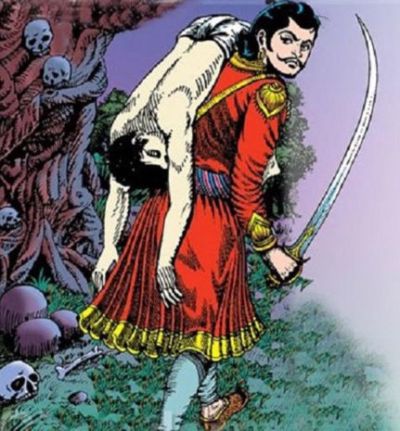“So tell me, o King, when the thief was impaled, and nearing death, and when he saw Ratnavatī coming there with her father, why did he weep first, and then why did he laugh? What was on his mind?
“Remember, if you know the answer, and don’t tell me the truth, your head will burst into a hundred pieces!“

अथ राजा प्रत्यवदद् रुदितं चौरेण दुःखतस् तेन ।
नास्यानृण्यम् अकारणबन्धोर् यातो ऽस्मि वणिज इति ॥ १२,२१.५९ ॥
आश्चर्यतश् च हसितं किम् इयं कन्या नृपान् वरान् हित्वा ।
मय्य् अस्मिन्न् अनुरक्ता स्त्रीचित्तम् अहो विचित्रम् इति ॥ १२,२१.६० ॥
इत्य् उक्तवाक्यस्य महीभृतो ऽंसान्
मायी स्वशक्त्यैव तदा जगाम ।
स्वं धाम वेतालवरः स राजाप्य्
एतं पुनः पूर्ववद् अन्वगच्छत् ॥ १२,२१.६१ ॥
The king replied…
“The thief was a brave man. He fought the king and his army single-handedly, and was no stranger to pain and suffering.”
“And so, he didn’t weep because of pain. Rather, he wept because he was unable to repay Ratnadatta for the generosity that he had shown towards him.”
“The merchant had become his well-wisher, and the thief was not accustomed to such kindness…”
“He laughed at the irony of it all – Ratnavatī, so rich and beautiful, had rejected well-off merchants, and even kings, only to fall in love with a thief like him!”
“Indeed, the heart of a woman is difficult to understand, thought the thief…”
As the king uttered these words, the Vetāla flew off his shoulder, laughing. And King Vikram once more started to walk towards the banyan tree, determined to fetch him.
पंचदशो वतेालः
The Fifteenth Story
Śaśiprabhā and the magic pill
ततो गत्वा पुनः प्राप्य वेतालं शिंशपातरोः ।
स त्रिविक्रमसेनस् तम् आदायोदचलत् पुनः ॥ १२,२२.१ ॥
आयान्तं तं च राजानं स वेतालो ऽंसपृष्ठगः ।
जगाद भूयो ऽप्य् एतां ते राजन् वच्मि कथां शृणु ॥ १२,२२.२ ॥
King Vikram went back to the tree, and bringing down the Vetāla, placed him across his shoulders and started to walk back.
The Vetāla said to the king “O king, let me tell you another story!”
अभून् नेपालविषये नाम्ना शिवपुरं पुरम् ।
यथार्थनामा तत्रासीद् यशःकेतुः पुरा नृपः ॥ १२,२२.३ ॥
स मन्त्रिणि न्यस्य भरं प्रज्ञासागरसंज्ञके ।
चन्द्रप्रभाख्यया देव्या सार्धं भोगान् असेवत ॥ १२,२२.४ ॥
कालेन तस्यां देव्यां च तस्याजायत कन्यका ।
राज्ञः शशिप्रभा नाम जगन्नेत्रशशिप्रभा ॥ १२,२२.५ ॥
क्रमेण यौवनस्था सा मधुमासे कदाचन ।
ययौ यात्रोत्सवं द्रष्टुम् उद्यानं सपरिच्छदा ॥ १२,२२.६ ॥
तत्रैकदेशे ऽपश्यत् तां कुसुमावचयोद्यताम् ।
उत्क्षिप्तबाहुलतिकालक्षितैकपयोधराम् ॥ १२,२२.७ ॥
प्रसूनवृन्तविगलत्संदंशकरशोभिनीम् ।
आढ्यपुत्रो मनःस्वामी नाम यात्रागतो द्विजः ॥ १२,२२.८ ॥
स तया दृष्टया सद्यो हृतस्य मनसो युवा ।
मनःस्वाम्य् अपि नैवाभूत् स्वामी मदनमोहितः ॥ १२,२२.९ ॥
मार्गणानां कृते किं स्विद् रतिर् एषा मनोभुवः ।
वसन्तसंभृतानीह पुष्पाण्य् उच्चिनुते स्वयम् ॥ १२,२२.१० ॥
A long time ago, in the janapadā of Nepāla, there was a city named Śivapura. The city was once ruled by a king named Yaśaḥketu.
He had an able minister named Prajñāsāgara (an ocean of wisdom), on whom he left the burden of the affairs of the kingdom.
Yaśaḥketu spent all his time with his queen Candraprabhā, and in the course of time, he became a father of a beautiful child who he named Śaśiprabhā (as bright as moonlight).
Śaśiprabhā grew up to be a very beautiful girl, and the envy of everyone’s eye.
One day in spring, when she was eighteen years old, she visited a garden at the centre of the city, in order to participate in some festivities. Also present in the garden was a Brāhman named Manaḥsvāmin (controller of the mind). He was the only son of a rich man.
Manaḥsvāmin saw Śaśiprabhā, running her hands through the flowers, smelling them, laughing when the butterflies flew away in alarm…and he fell in love that very instant. He felt that his heart was no more with him, and he felt that he was no longer a master of his feelings.
“Is this Rati, the Devi of love, who has come here in person to gather the flowers of spring, so that she can make arrows for Kāmadevā? Or is it the Devi of nature, who has come here to worship the spring?”
to be continued…
